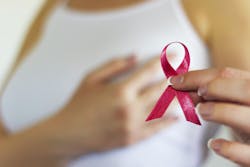New research indicates that for patients with breast cancer, the cancer’s stage and receptor status can help clinicians predict whether and when cancer might recur after initial treatment. The findings are published by Wiley online in CANCER, a peer-reviewed journal of the American Cancer Society.
For the study, Heather Neuman, MD, MS, of the University of Wisconsin, and her colleagues analyzed data on 8,007 patients with stage I–III breast cancer who participated in nine clinical trials from 1997–2013 and received standard of care therapy.
Time to first cancer recurrence varied significantly between cancers with different receptors—including estrogen receptor (ER), progesterone receptor (PR), and human epidermal growth factor receptor 2 (HER2). Within each receptor type, cancer stage influenced time to recurrence.
Risk of recurrence was highest and occurred earliest for ER−/PR−/HER2− (triple negative) tumors. Patients with these tumors diagnosed at stage III had a 5-year probability of recurrence of 45.5%. Risk of recurrence was lowest for ER+/PR+/HER2+ (triple positive) tumors. Patients with these tumors diagnosed at stage III had a 5-year probability of recurrence of 15.3%.

